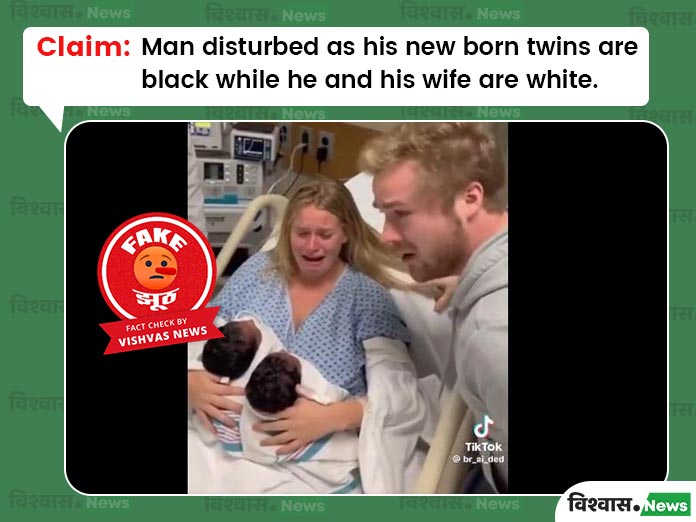Listen to the article
Viral Video of White Parents with Black Twins Debunked as AI Creation
A widely circulated video showing a white couple purportedly giving birth to dark-skinned twins has been confirmed as fake, according to an investigation by fact-checking organization Vishvas News.
The video, which went viral across multiple social media platforms, depicts a white woman in a hospital bed holding two brown-skinned newborns while her visibly distressed husband shouts in shock. Medical staff are shown attempting to calm the man as the dramatic scene unfolds.
The footage first appeared on TikTok on October 31, 2025, and quickly spread to other platforms, including Instagram, where user ‘raghavndtv’ shared it on November 3 with the caption: “Woman visited India to see the Taj Mahal in February. Black children with black hair. White husband, enraged at wife after seeing black twins.”
Vishvas News conducted a thorough analysis using multiple AI detection tools to verify the video’s authenticity. The Hive Moderation tool indicated an 86% probability of AI generation, while SightEngine showed a 99% likelihood that the content was artificially created. A third tool, Was It AI, also flagged the video as likely synthetic.
Visual inconsistencies further betrayed the video’s artificial origin. Investigators noted the man’s unnaturally stiff movements and the woman’s doll-like facial expressions that lacked realistic human qualities. These telltale signs of AI generation were confirmed by Azahar Machwe, a researcher specializing in artificial intelligence and emerging technologies, who pointed to several technical aspects that revealed the video’s fabricated nature.
“The hand movements of the medical staff and the structural anomalies in the woman’s hands are clear indicators of AI generation,” Machwe told investigators.
Perhaps most conclusively, the original source of the video was traced to a TikTok account with the handle @br_ai_ded, which openly acknowledges creating AI-generated content. The account features several similar videos produced using artificial intelligence tools.
This incident highlights the growing challenge of distinguishing between real and AI-generated content on social media. As AI technology becomes more sophisticated and accessible, misleading or false videos can spread rapidly, reaching millions of viewers before being debunked.
The phenomenon of AI-generated disinformation has become a significant concern for media literacy experts and fact-checkers worldwide. The realistic appearance of such content can lead to widespread misunderstanding and potentially harmful consequences when videos depict sensitive situations like the one in question.
Social media platforms have struggled to develop effective systems for identifying and flagging synthetic content. Many rely on a combination of automated detection tools and human reviewers, but the speed at which content spreads often outpaces verification efforts.
The Instagram account that helped propagate the false video has approximately 150,000 followers, demonstrating how accounts with substantial reach can inadvertently amplify misleading content.
Vishvas News concluded its investigation by definitively labeling the claim as false and the video as AI-generated, adding it to the growing catalog of synthetic media being mistaken for authentic footage on social platforms.
As AI-generation tools become more mainstream, experts recommend that users approach unusual or emotionally charged videos with heightened skepticism, particularly when they depict biologically improbable scenarios or contain visual inconsistencies.
Fact Checker
Verify the accuracy of this article using The Disinformation Commission analysis and real-time sources.




4 Comments
Interesting that the video was able to spread so widely before being debunked. I wonder if there are ways to improve detection and slow the spread of such AI-generated content in the future. It’s a tricky balance between enabling innovation and protecting against misinformation.
Wow, this is a fascinating case of AI-generated content. I wonder how the technology has advanced to create such realistic-looking scenes. It’s a good reminder to always be skeptical of viral videos and to fact-check before believing the hype.
This is a concerning development, but not entirely surprising given the rapid pace of AI advancement. I hope the relevant authorities are investing resources into improving detection and response capabilities.
This really highlights the rapid progress in AI and the need for rigorous verification, especially with visuals. It’s a bit unsettling to see how convincing these fabricated scenes can be. I hope we can stay ahead of the curve on these deceptions.